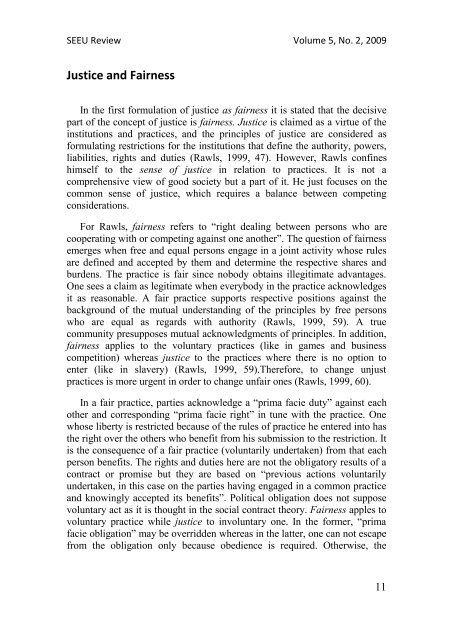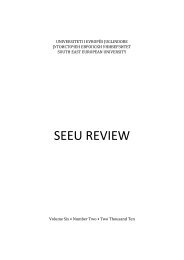SEEU Review vol. 5 Nr. 2 (pdf) - South East European University
SEEU Review vol. 5 Nr. 2 (pdf) - South East European University
SEEU Review vol. 5 Nr. 2 (pdf) - South East European University
Create successful ePaper yourself
Turn your PDF publications into a flip-book with our unique Google optimized e-Paper software.
<strong>SEEU</strong> <strong>Review</strong> Volume 5, No. 2, 2009<br />
Justice and Fairness<br />
In the first formulation of justice as fairness it is stated that the decisive<br />
part of the concept of justice is fairness. Justice is claimed as a virtue of the<br />
institutions and practices, and the principles of justice are considered as<br />
formulating restrictions for the institutions that define the authority, powers,<br />
liabilities, rights and duties (Rawls, 1999, 47). However, Rawls confines<br />
himself to the sense of justice in relation to practices. It is not a<br />
comprehensive view of good society but a part of it. He just focuses on the<br />
common sense of justice, which requires a balance between competing<br />
considerations.<br />
For Rawls, fairness refers to “right dealing between persons who are<br />
cooperating with or competing against one another”. The question of fairness<br />
emerges when free and equal persons engage in a joint activity whose rules<br />
are defined and accepted by them and determine the respective shares and<br />
burdens. The practice is fair since nobody obtains illegitimate advantages.<br />
One sees a claim as legitimate when everybody in the practice acknowledges<br />
it as reasonable. A fair practice supports respective positions against the<br />
background of the mutual understanding of the principles by free persons<br />
who are equal as regards with authority (Rawls, 1999, 59). A true<br />
community presupposes mutual acknowledgments of principles. In addition,<br />
fairness applies to the <strong>vol</strong>untary practices (like in games and business<br />
competition) whereas justice to the practices where there is no option to<br />
enter (like in slavery) (Rawls, 1999, 59).Therefore, to change unjust<br />
practices is more urgent in order to change unfair ones (Rawls, 1999, 60).<br />
In a fair practice, parties acknowledge a “prima facie duty” against each<br />
other and corresponding “prima facie right” in tune with the practice. One<br />
whose liberty is restricted because of the rules of practice he entered into has<br />
the right over the others who benefit from his submission to the restriction. It<br />
is the consequence of a fair practice (<strong>vol</strong>untarily undertaken) from that each<br />
person benefits. The rights and duties here are not the obligatory results of a<br />
contract or promise but they are based on “previous actions <strong>vol</strong>untarily<br />
undertaken, in this case on the parties having engaged in a common practice<br />
and knowingly accepted its benefits”. Political obligation does not suppose<br />
<strong>vol</strong>untary act as it is thought in the social contract theory. Fairness apples to<br />
<strong>vol</strong>untary practice while justice to in<strong>vol</strong>untary one. In the former, “prima<br />
facie obligation” may be overridden whereas in the latter, one can not escape<br />
from the obligation only because obedience is required. Otherwise, the<br />
11

















